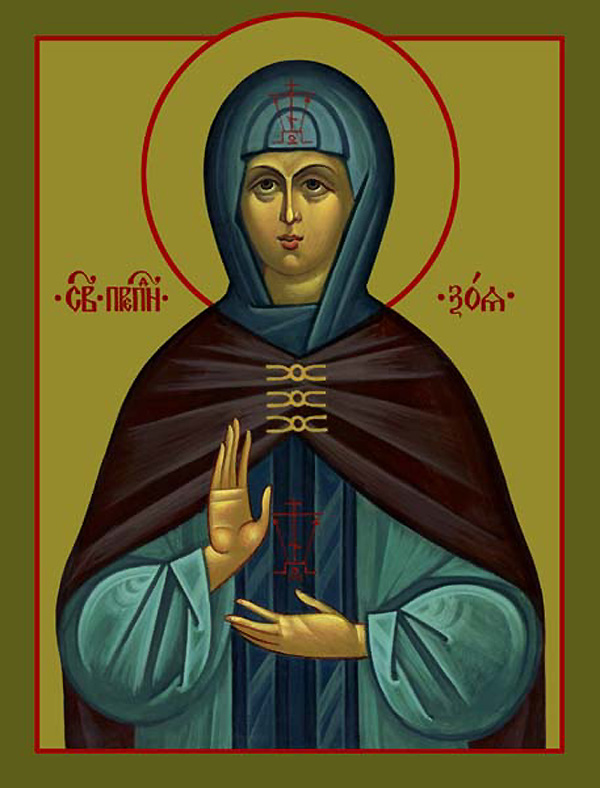Saints Martinian, Zoe, and Photina of Caesarea in Palestine

Saint Martinian went to live in the wilderness at the age of eighteen, not far from the city of Caesarea in Palestine. For twenty-five years, he devoted himself to ascetic deeds and silence, and he was granted the gift of healing illnesses and casting out demons. However, the Enemy of the human race would not stop troubling the holy ascetic with various temptations.
One day a prostitute overheard some citizens of Caesarea speaking of Saint Martinian's virtuous life, so she asked them why they were amazed by it. She said that he went to live in the desert because he could not endure the temptations of the flesh in the city. Furthermore, she made a wager with them that she could topple this pillar of virtue with her beauty and seduce him.
She came to him one night, dressed in shabby clothes, pretending that she had lost her way in the storm, and asking for shelter. Reluctantly, the saint allowed her to enter his cell, because he did not wish to be the cause of her death. He went into the inner room of his cell, telling her she would have to leave in the morning. After chanting Psalms according to his Rule, he went to sleep on the floor, but he was disturbed by carnal thoughts. Meanwhile, the wicked guest opened the bag she had been carrying and changed into her beautiful clothes and adorned herself with jewels.
When morning came, Saint Martinian came out to send the woman away. Though he was tempted by the woman’s beauty, he was determined not to fall into sin. Lighting a fire, he stepped into it, saying, “You want me to burn with temptation, but I will not give in to it. Instead, I choose to burn in this fire in order to preserve my purity and to escape the unquenchable fires of Hell."

The woman was astonished at the lengths Saint Martinian was willing to go, and she realized how evil she was. She repented and asked the saint to guide her onto the way of salvation. He told her to go to Bethlehem, and enter the convent founded by Saint Paula (January 26). There she lived as a nun for twelve years in strict asceticism until her blessed repose. The woman’s name was Zoe.
After his burns healed, Saint Martinian went to an uninhabited rocky island, and lived on it under the open sky for several years, nourished by the provisions brought by a certain sailor from time to time. In return the monk wove baskets for him.
One day a ship was wrecked by a powerful storm, and a woman named Photina floated to the island on pieces of the wreckage Saint Martinian helped her to survive on the island. “Remain here,” he told her, “for I am leaving you bread and water, and in two months a boat will come and return you to the mainland."
Saint Martinian refused to stay on the island with the woman, believing that it would be better to drown than to burn with lust. He jumped into the sea and swam away, and a pair of dolphins carried him to dry land. Thereafter, Saint Martinian led the life of a wanderer. Later, he came to Athens and fell ill. Sensing the approach of death, he went into a church and lay upon the floor. God revealed to the Bishop of Athens who Saint Martinian was, and the hierarch buried his body with honor. This occurred around the year 422.
As for Saint Photina, she did not board the ship when it came to the island, electing to stay there by herself. She asked the captain of the ship to have his wife bring her men's clothing and some wool, promising to make clothes for his family. She also asked the woman to bring her bread and water in addition to the other supplies.
Saint Photina lived on the island for six years, and then she went to the Lord. Two months after her repose, the captain and his wife found her incorrupt relics and brought them to Caesarea in Palestine. He had a vision which revealed many details of Saint Photina's life, which he shared with the bishop. Then they buried her with great honor and reverence.
